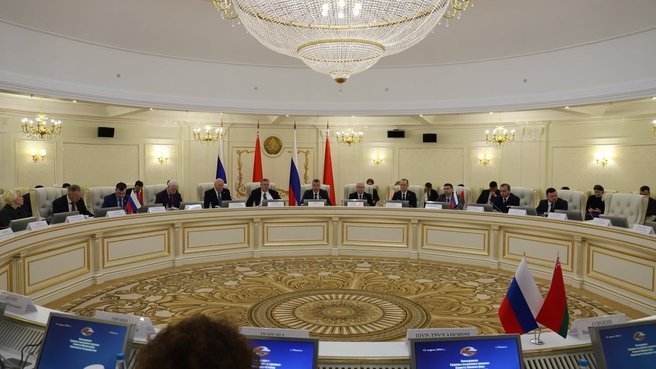Participants discussed joint efforts to promote trade and economic cooperation between Russia and Belarus.
The Ambassador Extraordinary and Plenipotentiary of the Republic of Belarus, on the authority of Russian Deputy Prime Minister Alexei Overchuk and Belarusian Deputy Prime Minister Dmitry Krutoy, held a meeting of the High-Level Group of the Federal State Council. The meeting took place in Minsk, Belarus. The ceremony was attended by Secretary of State of the Federation Dmitry Mezentsev, Ambassador Extraordinary and Plenipotentiary of the Russian Federation to Belarus Boris Gryzlov, and representatives of relevant Russian and Belarusian ministries and departments.

Meeting of the High Level Group of the Council of Federal Ministers of State
The High-Level Group Co-Chairs reviewed joint efforts to promote trade and economic cooperation between Russia and Belarus. It focused on developing transport connections between the two countries, synchronizing customs duties, regulating transport charges, creating more convenient conditions for mobile phone users, regulating taxi services, and implementing mutual visa recognition agreements.
At the beginning of the meeting, Alexei Overchuk emphasized that Russia and Belarus are working towards the creation of a common economy. They implemented 28 union programs and approved new key areas of activity for the next period 2024-2026.
“In 2023, the Belarusian economy grew by 3.9 percent, and the Russian economy by 3.6 percent. This figure is still being finalized.” is growing at a higher rate. In 2023, Russia's total cumulative investment in the Belarusian economy increased by 6.7% to almost $2.9 billion. The share of transactions in national currencies in the federal states is 92%. Therefore, we can say that we have translated the transactions between Russian and Belarusian economic operators into national currencies,” Oberchuk said.
The Co-Chairs emphasized the importance of continued production cooperation between Russian and Belarusian companies. “We produce high-value-added products that are competitive with external markers. We are making a lot of efforts to ensure that these products freely reach the main markets of the East and the Global South. “We are trying very hard to help Belarus in this respect,” Oberchuk said. “We will continue to implement the intergovernmental agreement to carry out joint investment projects worth Russian rubles 105 billion. Our industry ministers have drafted technical specifications for import substitution projects worth Russian rubles 81 billion. Remaining. funds will be spent on our efforts, import substitution and economic integration. 16 investment projects have already been implemented in Belarus, ”said Oberchuk.
Japan will continue to strengthen cooperation between regions. More than 80 of Russia's regions maintain trade and economic relations with the Republic of Belarus. “From March 2022 to February 2024, enterprises of 72 constituent entities of the Russian Federation concluded 5,236 foreign trade contracts with Belarusian partners, of which 3,387 and 1,849 were export contracts; “This is an import contract with a total value of more than 120 billion Russian rubles. Alternative policy,” the Deputy Prime Minister said. “Our forum also contributes to strengthening regional ties. This year, the Regional Forum of Russia and Belarus will be held in Vitebsk, Polotsk and Novoporotsk (Republic of Belarus) and will support the development of innovative economies in the federal state. Dedicated to the role of interregional cooperation. Indeed, this event will help promote relations between the two countries, and companies from both countries will sign new contracts on the sidelines of the forum. All this is due to the fact that Russia and Belarus It speaks to the constructive, friendly and fraternal approach to the great joint work carried out within the United States.”
Conference participants also reviewed progress in the implementation of the protocol decisions adopted by Allied countries. Work continued on the preparation and holding of the meetings of the Council of Ministers of the Federal States and the Supreme Council of the Federal States.
After the meeting, the Federal-State Standing Committee was directed to coordinate the implementation of the agreed agreements.

